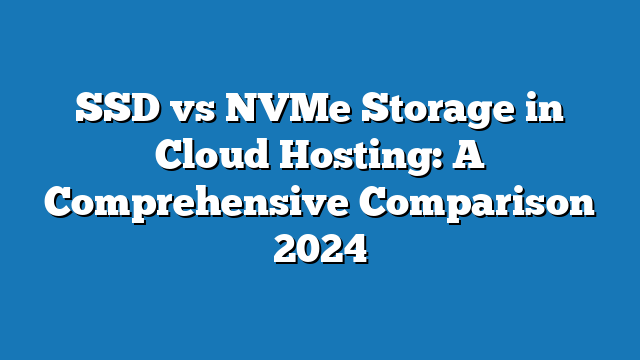Discover the differences between SSD vs NVMe Storage in cloud hosting. Learn which storage solution is best for your website’s performance, reliability, and scalability.
Introduction
When it comes to cloud hosting, the choice of storage can significantly impact your website’s performance and reliability. SSD vs NVMe Storage in cloud hosting is a crucial consideration for anyone looking to optimize their hosting environment. This guide explores the differences between SSD and NVMe storage, their benefits, and how to choose the best option for your needs.
Understanding SSD and NVMe Storage
SSD (Solid State Drive) storage uses NAND flash memory to store data, providing faster access speeds compared to traditional HDDs (Hard Disk Drives). SSDs have no moving parts, making them more reliable and durable.
NVMe (Non-Volatile Memory Express) storage, on the other hand, is a storage protocol designed to maximize the performance of high-speed PCIe (Peripheral Component Interconnect Express) SSDs. NVMe drives offer significantly faster data transfer rates and lower latency compared to traditional SSDs.
How SSD and NVMe Storage Work
SSD Storage
SSD storage operates using NAND flash memory cells, where data is stored in an array of memory cells made from floating-gate transistors. These cells can be accessed quickly, allowing for faster read and write speeds. SSDs use the SATA (Serial ATA) interface, which has limitations in terms of speed and data transfer rates.
NVMe Storage
NVMe storage leverages the PCIe interface, allowing direct communication between the storage device and the CPU. This direct path reduces the latency and increases the data transfer rates, enabling NVMe drives to perform much faster than traditional SSDs. NVMe drives are designed specifically for flash storage, optimizing the performance and efficiency of the storage device.
Comparing SSD vs NVMe Storage in Cloud Hosting
Speed and Performance
When comparing SSD vs NVMe Storage in cloud hosting, speed and performance are critical factors. NVMe storage significantly outperforms SSD storage in terms of read and write speeds. NVMe drives can handle more input/output operations per second (IOPS), making them ideal for high-performance applications and websites with heavy traffic.
Latency
Latency is another key difference between SSD vs NVMe Storage in cloud hosting. NVMe drives have much lower latency compared to SSDs, meaning data requests are processed faster. This results in quicker load times and a smoother user experience, especially for data-intensive applications.
Reliability
Both SSD and NVMe storage are highly reliable, thanks to their lack of moving parts. However, NVMe drives often come with advanced error correction capabilities and wear leveling, which can further enhance their reliability and lifespan.
Cost
Cost is an important consideration when comparing SSD vs NVMe Storage in cloud hosting. While NVMe storage offers superior performance, it is typically more expensive than SSD storage. SSDs provide a good balance of performance and cost, making them suitable for many applications, especially those with budget constraints.
Benefits of NVMe Storage in Cloud Hosting
- Unmatched Speed: NVMe drives offer faster read and write speeds, significantly improving website performance.
- Low Latency: Reduced latency ensures faster data processing and a better user experience.
- Scalability: NVMe storage can easily handle increased traffic and data loads, making it a future-proof solution.
- Reliability: Advanced error correction and wear leveling enhance the reliability and lifespan of NVMe drives.
Benefits of SSD Storage in Cloud Hosting
- Cost-Effective: SSD storage provides a good balance of performance and affordability, making it suitable for a wide range of applications.
- Faster than HDDs: SSDs offer much faster read and write speeds compared to traditional HDDs.
- Durability: With no moving parts, SSDs are more durable and reliable than HDDs.
Choosing the Right Storage for Your Needs
When deciding between SSD vs NVMe Storage in cloud hosting, consider the following factors:
- Performance Requirements: If your website or application demands high-speed performance and low latency, NVMe storage is the better choice.
- Budget: SSD storage offers a cost-effective solution with good performance, making it suitable for many applications with budget constraints.
- Future Growth: Consider your future growth and scalability needs. NVMe storage provides better scalability for growing websites and applications.
For affordable and reliable web hosting options, consider BigBirdWeb’s cheap web hosting.
For additional reliable VPS hosting options, you can also explore Infinity Server and Ultimate Free Host.
Conclusion
Choosing between SSD vs NVMe Storage in cloud hosting depends on your specific needs and budget. NVMe storage offers superior speed, lower latency, and better scalability, making it ideal for high-performance applications. SSD storage provides a cost-effective solution with good performance and reliability. By understanding the differences and benefits of each, you can make an informed decision to optimize your cloud hosting environment.
FAQs
What is the main difference between SSD and NVMe storage?
The main difference is that NVMe storage uses the PCIe interface, providing faster data transfer rates and lower latency compared to SSDs, which use the SATA interface.
Why is NVMe storage faster than SSD storage?
NVMe storage allows direct communication between the storage device and the CPU, reducing latency and increasing data transfer rates, resulting in faster read and write speeds.
Which is more cost-effective, SSD or NVMe storage?
SSD storage is generally more cost-effective, offering a good balance of performance and affordability. NVMe storage, while more expensive, provides superior performance.
Can NVMe storage handle high-traffic websites?
Yes, NVMe storage is ideal for high-traffic websites due to its ability to handle more input/output operations per second (IOPS) and lower latency.
Is SSD storage reliable for cloud hosting?
Yes, SSD storage is highly reliable due to its lack of moving parts and faster read/write speeds compared to traditional HDDs.
What should I consider when choosing between SSD and NVMe storage?
Consider your performance requirements, budget, and future growth needs. NVMe storage offers better performance and scalability, while SSD storage is more cost-effective and still provides good performance.
